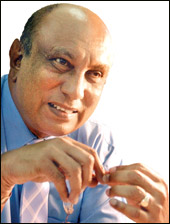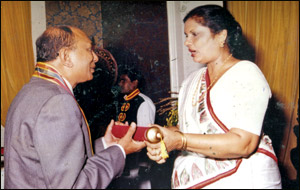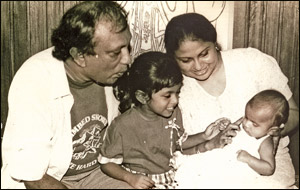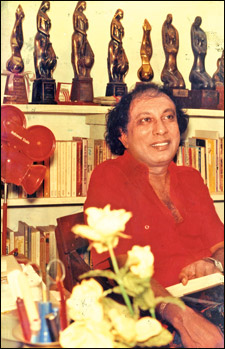Legacy of a legend
Preserve the virtuoso :
Sachitra MAHENDRA
|

Tissa Abeysekara |
|

Being awarded the Kala Suri State Honour for contribution to Sri
Lankan Film |
|

Ashoka Pieris, Tissa Abeysekara and Upali Attanayaka |
Tissa Abeysekara marked his emblem in the culture and arts industry
of this small hamlet called Sri Lanka. He could see the society in a
truly artistic manner. Artistes of such calibre are indeed a rare find.
However his legacy faces a threat, since no biographical work has
been published to this day. Except for an article or two or some
Wikipedia entry, no serious work has been authored on the veteran.
Ediriweera Sarachchandra and Martin Wickramasinghe at least authored
their own autobiographies hence their life and times are left open for
posterity. Even G. B. Senanayake has a website if someone needs to
study. With years slip by fast, what will be left of Tissa for
posterity, is the question that looms large right before us.
Tissa was born to feel the sight and sound, and that experience
remained firm with him till the grave. This may be precisely why
whatever he tried turned out to be a masterpiece in most cases. His
strong bilingual background must have helped him think afresh of what he
saw and heard.
He had an eloquent taste for culture and arts, and for that matter
his knowledge storage was sharp ranging from history to movie both
oriental and occidental. Good command of both Sinhala and English, deep
voice, sensitive expression and so on ranks Tissa Abeysekara among the
top virtuosos in our country. He didn't produce many masterpieces, but
the little he produced is truly remarkable. Sadly however the
generations to come would miss out his legacy, if things will continue
just the same way.
|

The Tissa Abeysekara family |

On location |
Why preserve Tissa Abeysekara, after all?
Seldom do we witness skilled artistes such as Abeysekara. Any such
event should inspire more research and studies into their making:
background and influence in essence. This kind of biographical study
motivates many more would-be Abeysekaras. The few books Abeysekara has
written are mostly part autobiographical. It must suffice to initiate
the long-forgotten assignment.
*********
We hold on to favourite books for reasons that are not universal.
Each word and sentence in this one carried me into arms I'd been in
before. No other book brings me as close to my lost self.
It is a lost classic for me, too, because of the book's quick fate.
Published in Sri Lanka by a small press, it has so far not been
published anywhere else. It was a story written far from the publishing
centres of the west and there it remains. Still lost to the rest of the
world."
- Michael Ondaatje on Bringing Tony Home
*********
Contents of Tissa's last work 'Bringing Tony Home'
* Elsewhere: Something like a Love Story Two childhood lovers come
together as adults briefly revisiting the bittersweet events of their
forbidden love fifteen years before.
* Poor Young Man: A Requiem The boy, as a young man, tries to make
sense of his complex relationship with his father during the years his
family's fortunes were disappearing.
* Hark, The Moaning Pond: A Grandmother's Tale. A much older man
revisits the loss of his grandmother and experiences a profound
revelation of her place in the history and mythology of her people.
**************
TISSA ABEYSEKARA Chronology
BIOGRAPHY
May 7 1939 Born in
Maharagama, a little railroad town twelve miles southeast of Colombo to
middle-class parents who had moved from the city to the country in the
middle thirties.
Not sent to school till age eleven due to poor health and tutored at
home. Enters private school in 1951. Reveals a flair for writing early
and has his first short story published at age thirteen in a prestigious
national daily paper. Continues to write in both Sinhala (Mother tongue)
and English contributing regularly to newspapers and magazines right
through the middle-teens.
1954 Enters Dharmapala
Vidyalaya, Pannipitiya. Continues to excel in studies obtaining a First
Division Pass in the Senior School Certificate Examination.
1958 At age nineteen drops
out of school and after a brief stint at teaching becomes free-lance
journalist.
|

With his awards |
1961 Publishes collection
of short stories.
1963 Gains recognition as
an outstanding Film and Theatre critic in print and radio.
FILMOGRAPHYs
1964 Joins Lester James
Peries as Dialogue Writer and First Assistant Director on Gamperaliya,
which won the Golden Peacock Award for Best Feature Film at the Third
International Film Festival, New Delhi.
1965 - 72 Works primarily
as a Screenwriter authoring eight scripts for major films and wins Best
Scriptwriter Award four times annually at the national film awards. One
film scripted during this period, Nidhanaya (Treasure) was selected the
Best Film in Fifty Years of Sri Lankan Films in 1997 by a Critics poll.
1972 Joins the Government
Film Unit of Sri Lanka as a Film Director and works under the tutelage
of the legendary German filmmaker Paul Zils who was Consultant to the
Unit at the time.
1978 Directs his first
full-length feature film based on an award-winning and highly
controversial Sinhala novel, Karumakkarayo (The Ill Fated).
1980 Leaves the Government
Film Unit to become free-lance filmmaker. Writes Produces, and Directs,
second feature, Mahagedara (The Family Home)
1981 Mahagedara (The
Family Home) wins all the major awards including the ones for Best Film
and Best Script at the Presidential Awards. The same film wins for
Abeysekara his first award for Best Director at the Sarasaviya National
Film Awards. At this Festival he is also awarded the Best Supporting
Actor's award.
1985/86s Writes and Directs third feature film, based on a novel by
Martin Wickremasingha and regarded as the greatest work in contemporary
Sri Lankan fiction. Titled after the book as Viragaya (The Way of the
Lotus), the film becomes a major critical and box-office success and was
screened by special invitation at Moscow, Hawaii, and New Delhi
Festivals.
Viragaya (Way of the Lotus) sweeps all the National Film Awards for
the Year 1986.
1989 Course Director on
Television Script Writing Course, conducted by the Sri Lanka Television
Training Institute.
1992 Curates and presents
as Director, the South Asian Documentary and Short Film Festival in
Colombo on behalf of the International Centre for Ethnic Studies.
1993 February - September,
writes, produces, and directs, Part One of a 12 hour major Television
Series - The Outsiders, in technical collaboration with the Sri Lanka
Television Training Institute.
1994 October. Participates
as a speaker at a seminar on the influence of the American Cinema on
South Asian film, at the American Studies Center, Hyderabad, India.
1995 February - August.
Writes, produces, and directs, a Television adaptation of R.L.Spittel's
anthropological novel, The Savage Sanctuary, based on the indigenous
peoples of Sri Lanka.
1998 The Outsiders, wins
all the major awards at the National Television Awards.
Writes and produces a 13-Part Television Series titled Maya based on
an English novel.
1999 Writes, produces and
directs, The Sun and The Moonstone, a major documentary on Sri Lanka, to
commemorate 50 years of independence; sponsored by the People's Bank.
Post-production work was completed in Germany.
2000 Writes and produces,
Roots of Paradise, a documentary on the ruined cities of Sri Lanka;
sponsored by the Cultural Triangle of Sri Lanka.
2002 September 12-13.
Presented paper at seminar, Understanding Hollywood: From Real to Reel;
Chandigarh/India. Sponsored by USEFI.
September 29 - October 03. On invitation from the Japan
Foundation/Asia Center, for Sri Lankan Film Festival in Tokyo. Film, Way
of The Lotus screened as part of the programme.
2003 Writes, produces, and directs, Other Peoples, Other Voices, a 07
part Documentary on the theme of majoritarianism within the context of
the ethnic war and its impact on the border villages; sponsored by the
Human Rights Organization, Colombo.
OTHER AWARDS and HONOURS
1996 Wins the Gratiaen
Award for the Most Outstanding Piece of Creative Fiction by a Sri Lankan
resident for his Novella - Bringing Tony Home.
Awarded Honorary Life Membership by the Tele Makers Guild of Sri
Lanka for outstanding contribution for the development of television in
Sri Lanka.
1997 Awarded Kala Suri
State Honour for contribution to Sri Lankan Film.
1998 Awarded Sarvodaya
National Award for the contribution made to the upliftment of the
Communication Arts
1998, April 20. Awarded
Vishwa Prasadini, State Award for outstanding contribution to the arts.
Book, Bringing Tony Home, included in a collection, Lost Classics,
published by Bloomsbury, U.K. (Michael Ondaatje's choice)
2005 September. Awarded
Ranathisara (Golden Swan) Award for Lifetime Achievement in Film in Sri
Lanka, at the Sarasaviya National Awards.
2005 November. Conferred
Deshabandu National Honour by the Government of Sri Lanka for unique
contribution to the Nation.
2007 June. Conferred D.
Litt (Honoris Causa) by the University of Colombo
POSITIONS HELD/OTHER ACTIVITIES
1999, August - 2001,
December.
Chairman/CEO, National Film Corporation of Sri Lanka.
2002 April/May.
Jury Member, International Film Festival, Kerala.
2003 - January
Chairman Panel of Judges for the Gratiaen Literary Award for 2002.
2004
April. Appointed Board Member, Sri Lanka Rupavahini Corporation.
May. Appointed Member, Management Committee, Aesthetic Institute,
University of Kelaniya.
July. Assumed duties as Director, Sri Lanka Television Training
Institute. Position held until December 2006
2005
March. Participated and presented a paper on the Sinhala Novel, at
the 50th Anniversary Conference of the Sahitya Akademi of India/New
Delhi, by invitation.
October. Publication of three Novellas in English collectively
titled, In My Kingdom of the Sun and the Holy Peak.
August. Appointed Member of the Governing Council for the University
of Visual & Performing Arts, Sri Lanka.
September. Appointed Member National Heritage Trust of Sri Lanka.
2006
March. Published collection of essays on film, music, poetry, and
facets of history of Sri Jayawardenapura Kotte, in Sinhala, titled Ayale
Giya Sithaka Satahan.
August. Published a collection of essays in English on film and the
allied arts titled: Roots, Reflections and Reminiscences
************** |



